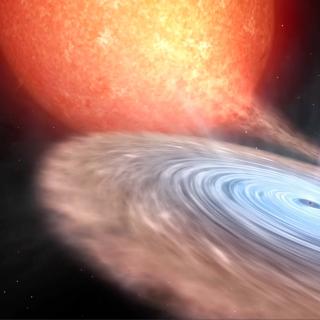Bibcode
Curran, P. A.; Tzioumis, T.; Stevens, J.; Russell, D. M.; Migliari, S.; Markoff, S.; Krimm, H. A.; Körding, E. G.; Fender, R. P.; Corbel, S.; Belloni, T. M.; Altamirano, D.; Woudt, P.; Sivakoff, G. R.; Edwards, P. G.; Armstrong, R. P.; Miller-Jones, J. C. A.; Coriat, M.
Referencia bibliográfica
Monthly Notices of the Royal Astronomical Society, Volume 437, Issue 4, p.3265-3273
Fecha de publicación:
2
2014
Número de citas
34
Número de citas referidas
32
Descripción
Swift J1745-26 is an X-ray binary towards the Galactic Centre that was
detected when it went into outburst in 2012 September. This source is
thought to be one of a growing number of sources that display `failed
outbursts', in which the self-absorbed radio jets of the transient
source are never fully quenched and the thermal emission from the
geometrically thin inner accretion disc never fully dominates the X-ray
flux. We present multifrequency data from the Very Large Array,
Australia Telescope Compact Array and Karoo Array Telescope (KAT-7)
radio arrays, spanning the entire period of the outburst. Our rich data
set exposes radio emission that displays a high level of large-scale
variability compared to the X-ray emission and deviations from the
standard radio-X-ray correlation that are indicative of an unstable jet
and confirm the outburst's transition from the canonical hard state to
an intermediate state. We also observe steepening of the spectral index
and an increase of the linear polarization to a large fraction (≈50
per cent) of the total flux, as well as a rotation of the electric
vector position angle. These are consistent with a transformation from a
self-absorbed compact jet to optically thin ejecta - the first time such
a discrete ejection has been observed in a failed outburst - and may
imply a complex magnetic field geometry.
Proyectos relacionados

Agujeros negros, estrellas de neutrones, enanas blancas y su entorno local
Los agujeros negros y estrellas de neutrones en binarias de rayos-X son laboratorios únicos para explorar la física de estos objetos compactos. No solo permiten confirmar la existencia de agujeros negros de origen estelar a través de mediciones dinámicas de sus masas, sino que también permiten investigar el comportamiento de la materia y la
Montserrat
Armas Padilla